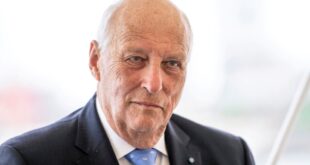I was struck when I was posting my Christmas cards – ever the optimist, given the mail strike – that our stamps still have the late Queen’s head on them, even the ones specially printed for the festive season. Our coins still have her face embossed on them, and she continues to look out at us from our fivers and tenners, although new designs featuring King Charles III have been drawn up. It’s as if we’re reluctant to see the Elizabethan age finish, even though it really came to an end when Elizabeth II died on September 8.
But today at 3pm, the curtain will finally come down on that era and rise on the new one, when the King gives his first Christmas Day message to the nation. Elizabeth II was a part of Christmas for 70 years, so having the new King speak to us will be momentous. It will also be the first time ever that a King has appeared on TV on Christmas Day; George V and George VI’s seasonal broadcasts were wireless talks, before the television age.
That King Charles’s first December 25 broadcast is both the continuity of a tradition and symbolic of change is highly appropriate, for that is exactly what Christmas is about. Whether it’s always Midnight Mass for you, rather than morning matins, or that you serve mince pies with brandy butter and most definitely not cream or rum sauce, we all have our habits that are as precious as any gift we might find under the tree. Yet change is always part of the picture, too.
You might always put Granny’s star on the top of the tree but your new daughter-in-law might want the fairy her mother always used. A bracing walk on Boxing Day? Your son’s girlfriend, staying this year for the first time, thinks it a frightful idea and persuades everyone else to stay in for a marathon Cluedo session. Get in a huff or go with the flow? Sometimes tradition does have to give way to changing times.
The more profound changes at Christmas can make it a melancholic time. The family splits that mean some relatives no longer come by, and the deaths that leave a huge gap at the dinner table. The Royal Family may feel these absences particularly keenly this year – as will people across the country, whose own families have endured loss. But new family members arrive too, whether new partners or young children – another way in which Christmas highlights these shifting sands of life.
The challenge with change is recognising when we need to deal with it, even if it makes us uncomfortable, and when we should resist it. And with cancel culture in full spate, there are plenty of people wanting us to forego traditions, and knuckle down and accept whatever is the latest modish way of thinking. If values are determined by nothing more solid than what is trending on social media, then life becomes ever more fragile.
But the greatest difficulty comes when change brings both benefits and problems. It might be progress to recognise that health is as much about mental as physical well-being but the growing obsession with self is surely a step too far. The stiff upper lip is deeply out of fashion, but the return of traditional British stoicism would be welcome.
Our new King embodied that spirit of dignity when his mother died: the eyes might have been a little watery when he addressed the nation soon after her death but that evening, and in the days following, he held himself together as he led the country in mourning. Having the King weeping openly would have broken the Royal Family’s conventions but conveyed no more about loss than his eloquent words.
This Christmas, however, remembering family members we have lost, many might well shed a tear. It’s the moment we recognise things stay the same, yet are ever changing. And let’s not forget that some would like life to change so much that Christmas itself might be cancelled. This is the season to be merry. Winterval, it is not.
Source link



